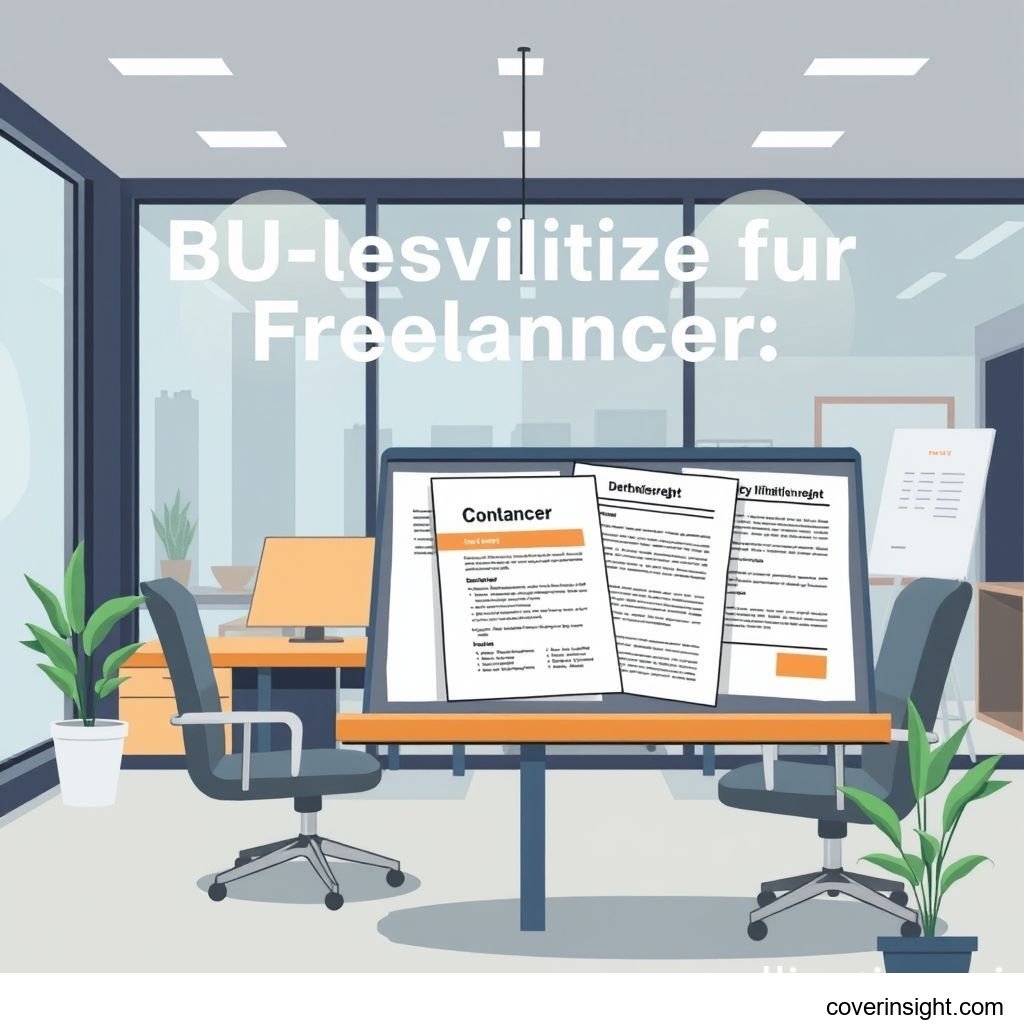Introduction
As a freelancer in Germany, navigating the intricate world of insurance can often feel like a Herculean task, especially with an eye towards 2025. Among the various protections, the Berufsunfähigkeitsversicherung (BU), or occupational disability insurance, stands out as a cornerstone of financial security. Within this vital policy, the "Verweisungsrecht Klauseln" – the right of referral clauses – are absolutely critical, particularly for the self-employed. These clauses determine whether an insurer can deny your claim by pointing to another profession you could theoretically still perform, even if it's vastly different from your original one and pays significantly less. For freelancers, whose livelihood often depends on highly specialized skills and specific project work, understanding and securing a BU policy with a strong waiver of these "Verweisungsrecht Klauseln" is not just advisable, it's a strategic imperative to protect your future income.
Coverage Details
What’s Included
A robust Berufsunfähigkeitsversicherung, especially tailored for freelancers, offers comprehensive protection against the financial fallout of being unable to perform your profession due to illness or accident. When it comes to "Verweisungsrecht Klauseln," a high-quality policy should include a clear "Verzicht auf abstrakte Verweisung" (waiver of abstract referral). This means the insurer cannot point to any theoretical job you could perform, no matter how unrelated to your actual work experience or qualifications. For instance, a graphic designer who can no longer use their hands for intricate work due to a nerve condition should not be "referred" to a job as a security guard.
Furthermore, some top-tier policies also include a "Verzicht auf konkrete Verweisung" (waiver of concrete referral) or at least a highly restrictive one. While "konkrete Verweisung" applies if you actually take up a new job, a strong waiver ensures that you're only referred if the new job is genuinely equivalent in social standing and income to your previous one. This offers a vital safety net, ensuring that your BU truly protects your current professional standing and income level, preventing you from being forced into a completely unsuitable or demeaning role. Based on my experience, especially for freelancers, insisting on a comprehensive waiver of abstract referral is non-negotiable – it's the bedrock of a good BU.
Common Exclusions
Even with strong "Verweisungsrecht Klauseln" waivers, it’s crucial to be aware of common exclusions and limitations. Pre-existing conditions that were not declared or were intentionally withheld during the application process can lead to the invalidation of the policy or denial of claims. Specific hazardous hobbies or activities (e.g., professional extreme sports) might also be excluded or require special surcharges. Mental health issues, while increasingly covered, might still have specific conditions or waiting periods in some policies. It’s also important to note that the policy only covers occupational disability, not general unemployment or a decline in project work. Always read the "Kleingedruckte" (fine print) carefully, as not all waivers are created equal. Some may have nuanced wording that still leaves room for the insurer to refer you in specific circumstances. For further reading, explore our [Insurance Resources Global] for general guidance.
Cost Analysis
Price Factors
The premium for a Berufsunfähigkeitsversicherung with strong "Verweisungsrecht Klauseln" waivers is influenced by several key factors:
-
Age at Entry: The younger you are when you sign up, the lower your premiums typically are, as the risk of occupational disability is statistically lower.
-
Health Status: Your current health, medical history, and pre-existing conditions play a significant role. Honesty in health declarations is paramount.
-
Profession/Occupation: Freelance professions are assessed for their specific occupational risks. An IT consultant might have lower premiums than a construction engineer, for example. The insurer evaluates how demanding your specific tasks are.
-
Desired Pension Amount: The higher the monthly BU pension you wish to receive, the higher the premium.
-
Policy Term and End Age: The longer the period of coverage (e.g., until age 67), the higher the cost.
-
Additional Clauses: Riders for dynamic increases (Dynamisierung), care dependency (Pflegebedürftigkeit), or specific illness coverage can also increase the premium.
Saving Tips
While securing robust "Verweisungsrecht Klauseln" is vital, there are ways to manage the cost of your BU:
-
Early Entry: The most effective way to save is to take out the policy as early in your career as possible.
-
Health Check-ups: Ensure you are in good health before applying, as this can result in better conditions. If you have minor issues, discuss them transparently with an independent broker.
-
Sensible Benefit Amount: Don't over-insure. Calculate the actual monthly income you would need to cover your essential living costs and liabilities if you became unable to work.
-
Waiver of Abstract Referral First: Prioritize a complete waiver of abstract referral over a concrete one if budget is extremely tight, as the former is far more critical for freelancers.
-
Compare Offers: Don't settle for the first offer. Compare various providers and their specific policy wordings regarding "Verweisungsrecht Klauseln." Websites like BaFin's consumer section or the GDV's resources can provide general guidance on what to look for. For more detailed insights, you might want to visit [DE Insurance Home].
FAQs
How much does Verweisungsrecht Klauseln cost?
"Verweisungsrecht Klauseln" don't have a separate cost. Instead, a strong waiver of these clauses is a quality feature within a Berufsunfähigkeitsversicherung policy. Insurers that offer such comprehensive waivers generally charge slightly higher premiums than those with weaker or no waivers, as they take on greater risk. The overall cost of your BU policy is a composite of all the factors mentioned in the "Price Factors" section.
What affects premiums?
Premiums are primarily affected by your age at the time of application, your current health status and medical history, your specific profession (with associated risks), the desired monthly pension amount, and the duration of the policy. The more comprehensive the coverage, especially concerning the crucial "Verweisungsrecht Klauseln," the higher the premium tends to be.
Is it mandatory?
No, Berufsunfähigkeitsversicherung with "Verweisungsrecht Klauseln" waivers is not legally mandatory in Germany. However, for freelancers, it is widely considered indispensable. Unlike employed individuals who might rely on statutory social security (albeit limited), freelancers lack such extensive fallback options, making private BU protection a crucial part of their financial planning. According to statistics from the German Federal Statistical Office (Destatis), while the number of freelancers has steadily grown, the penetration rate of comprehensive BU insurance among them still leaves much to be desired, leaving many vulnerable.
How to choose?
Choosing the right policy requires careful consideration. Prioritize policies that offer a clear and explicit "Verzicht auf abstrakte Verweisung." Look for policies with clear definitions of occupational disability and check the insurer's financial stability (e.g., ratings by independent agencies). It’s highly advisable to consult with an independent insurance broker who specializes in freelancer insurance and can compare various providers and their specific policy wordings. A good broker will help you understand the nuances, such as how the [BaFin - Federal Financial Supervisory Authority] oversees insurers, ensuring a robust choice.
Consequences of no coverage?
Without a Berufsunfähigkeitsversicherung, especially one with strong "Verweisungsrecht Klauseln" waivers, freelancers face severe financial repercussions if they become unable to work due to illness or injury. You would likely lose your primary source of income with little to no state support tailored to your professional loss. This could lead to significant debt, the depletion of savings, and a drastic reduction in your standard of living. Imagine, for example, a seasoned architect in Berlin (a real-world example might involve an architect named "Herr Schmidt") who, due to a severe back injury, can no longer sit for prolonged periods or visit construction sites. Without a BU that waives "Verweisungsrecht," an insurer could theoretically argue he could still work as a call center agent, denying his claim. With a proper waiver, Herr Schmidt would receive his agreed-upon monthly pension, allowing him to focus on recovery and adaptation, rather than facing financial ruin and being forced into an unsuitable job. This is not just about financial security; it's about maintaining your independence and dignity, "auf Nummer sicher gehen." You can find more insights on this from organizations like the [GDV - German Insurance Association].
Author Insight & Experience
As someone living in Germany and having observed the landscape for freelancers, I can attest that securing a robust Berufsunfähigkeitsversicherung with comprehensive "Verweisungsrecht Klauseln" waivers is not just a smart move; it’s an absolute necessity. I've seen firsthand how a well-chosen policy can be a lifeline when life throws a curveball, protecting not just income, but an entire way of life. Conversely, I’ve also witnessed the desperate struggle of those who, perhaps due to oversight or a desire to save a few euros, opted for a cheaper policy with weaker clauses, only to find themselves stuck in a bureaucratic quagmire when they needed help most. The slightly higher premium for top-tier "Verweisungsrecht" protection is, in my professional opinion, one of the best investments a freelancer can make in their future in Germany. It’s about building a robust financial fortress around your entrepreneurial spirit.







Comments